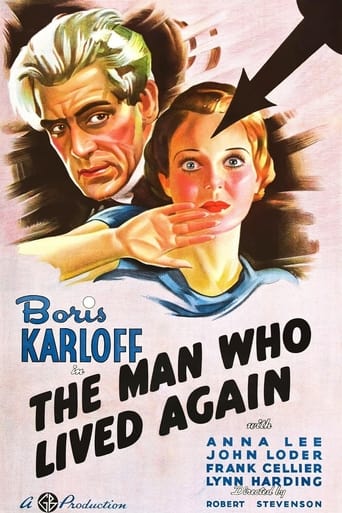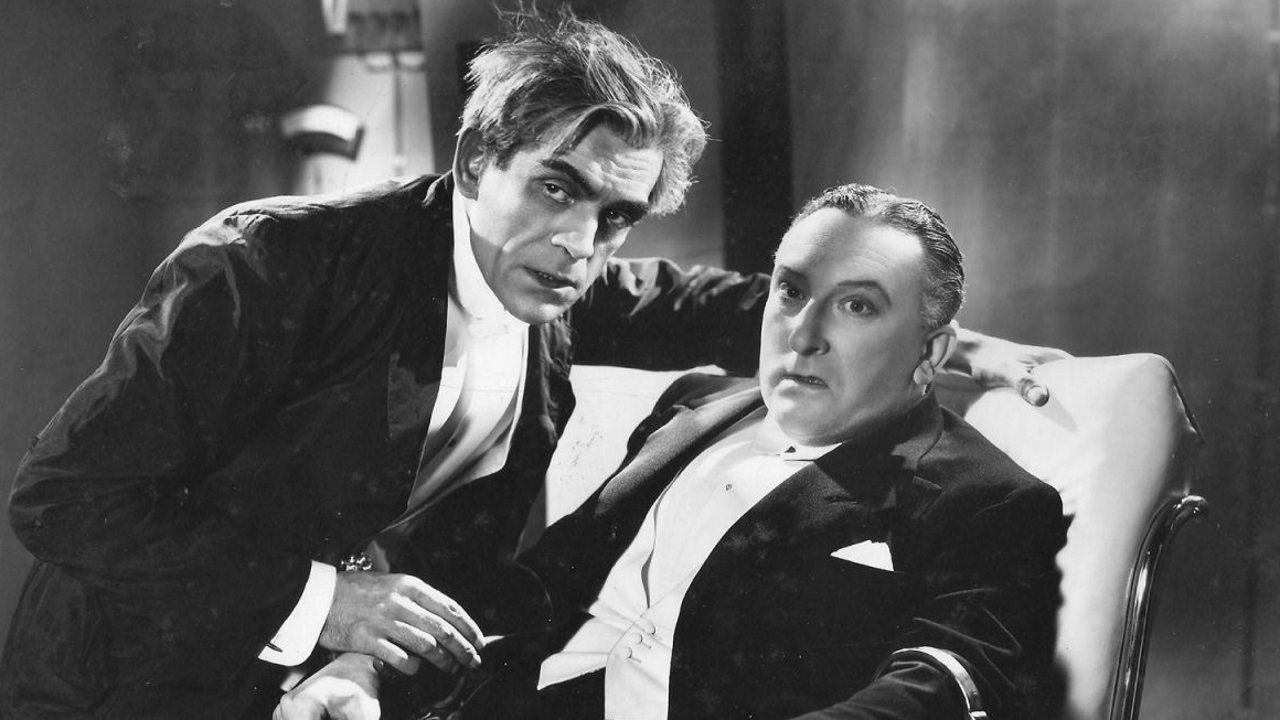begob
A bright young scientist accepts an invitation from a genius, only to resist his effort at domination of ... life!A little gem. Just 66 mins, but with a perfectly symmetrical plot, good performances, and moral outcome. Karloff is good, but the Oscar goes to the character who starts as a cripple and ends as an overbearing boss - played by two actors - with some great lines and whiplash irony.Photography is good, with plenty of close ups. Editing is so fast, like kung fu on speed - maybe it's too much, truncating scenes so that they lose their mood. Honestly, this mystifies me - it made the film seem so much more professional than contemporary Hollywood horrors, and yet the pace lagged a bit. It could have been twenty minutes longer, and still felt shorter.As usual there's a sweet female influence, but it comes through with a punch at the end. Better than, say, The Imitation Game.Overall: smart telling of a good story.
bkoganbing
Boris Karloff returned to Great Britain for a few films, this one The Man Who Lived Again being one of them. It was done for Gainsborough Pictures and it had Boris once again as a mad scientist. In the scientist role Karloff must have looked at this as familiar material.As a scientist Karloff is doing Frankenstein like experiments. But not with cadavers and stolen brains creating life from the ground up. Here he's in the business of exchanging souls. Literally taking the experiences imprinted on our gray matter and with some mad scientist type equipment putting two animals or two men as it were and exchanging all the life experiences that sum up a human being and swapping it with another's experiences.He's even impressed young doctor Anna Lee with his genius, but she runs when she learns the nature of his experiments. It's an interesting premise, but Gainsborough Pictures didn't invest too heavily in this one other than get Karloff back from America.I wonder if this is the origin of Freaky Friday and a host of imitators.
siderite
It's difficult to say that a movie from the 30s is filled with clichés, because at the time they weren't so. The mad scientist, the arrogant businessman, the cocky boyfriend and the kind and clever woman, they are all here and doing the same things they do in today's movies. Perhaps at time time they were book stereotypes... How we can't improve on the story of films after 80 years is a testament of our complacency as humans. Perhaps this is why mad scientists appear, they are only men of science at the beginning, but the world drives them mad. There is such a scene in the movie and one of the few in the genre that try to explain the desperation that takes one to do insane things. In this time, the madness of the scientist is a given and nobody cares why he does it, only that he die in an explosion wild eyed and screaming "Noo!".All in all, a classic of horror.
Coventry
Luckily we know better than to judge a movie by its title, otherwise perhaps nobody would ever bother to check out "The Man Who Changed His Mind". When I hear a title like that, I imagine the fascinating story of a man sitting in a bar and ordering a cup of coffee. Yet, when the waitress brings the order, he claims to have changed his mind and now wants a cup of tea instead. Obviously, this is NOT what this early collaboration between horror veteran Boris Karloff and the respectable director Robert Stevenson is about. No actually, you may interpret that title very literally, as Karloff depicts an obsessive and utterly bonkers scientist who's able to transfer the brain substance of one individual's body to that of another. The genius but anti-social and obnoxious Dr. Laurience is the subject of mockery and disbelief amongst his colleagues, but with the help and encouragement of his new and lovable assistant Clare Wyatt, he even manages to get his research financed by a wealthy newspaper tycoon. When they announce to stop the financing prematurely, however, Dr. Laurience mentally snaps and uses his opponents as reluctant guinea pigs. "The Man Who Changed His Mind" is a very modest and sadly overlooked 1930's horror gem that actually deserves to have a slightly more respectable status. The film is very straightforward and certainly doesn't waste any time with its running time of barely 62 minutes. The introduction of the characters is brief and to-the-point, the dialogs are never longer than absolutely necessary and even the obligatory triangular relationship aspect between the mad scientist, his assistant and her fiancée is kept to a minimum. The acting performances are admittedly rather stiff, including the one given by the amazing Mr. Karloff, but his crazy eyes and naturally malignant charisma (and in this case also his wildly outrageous haircut) are more than enough to make him a very scary protagonist. Speaking of scary, the film has a couple of noteworthy tense moments, like the actual brain transfers and the race-against-the-clock finale. Definitely one of Karloff's better "evil scientist" movies from the era, this one was shot and produced in England. For some reason, UK horror movies always feature an extra bit of menacing atmosphere and creepy elegance. The young and developing talent of director Robert Stevenson also might have helped, of course. In heavy contrast to this morbid little film, Stevenson would later direct some of Disney's big successes like "Old Yeller", "Mary Poppins" and "Herbie, the Love bug".


 AD
AD



